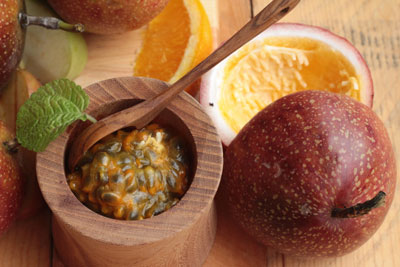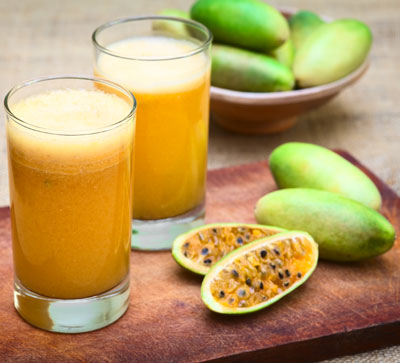





1. Passionfruit Facts
2. Types of Passionfruit
3. Nutritional Value of Passionfruit
4. Health Benefits of Passionfruit
Passionfruit (Passiflora edulis) is a vine species of passionflower. The fruit is a pepo, a type of botanical berry, round to oval, either yellow or dark purple at maturity, with a soft to firm, juicy interior filled with numerous seeds.
The fruit produced is a pepo and entirely fleshy (making it botanically a berry) and is spherical to ovoid. The outside colour of the pepo ranges from dark purple with fine white specks to light yellow. The fruit is 4–7.5 cm in diameter; purple fruits are smaller, weighing around 35 grams, while yellow fruits are closer to 80 grams. The smooth, leathery rind is 9–13 mm thick, including a thick layer of pith. Within the pepo, there are typically 250 brown seeds, each 2.4 mm in length. Each seed is surrounded by a membranous sac filled with pulpy juice. The flavour of the juice is slightly acidic and musky. The passion fruit's flavour can be compared to the guava fruit.
History and Origin
Passionfruit originated in the subtropical regions of South America, particularly Brazil, Paraguay, and northern Argentina. It was spread globally by Spanish and Portuguese explorers and is now cultivated in tropical and subtropical areas worldwide, including Australia, New Zealand, South Africa, and parts of the U.S. and Asia.
- • Misty Gem
- • Sweetheart
- • Nellie Kelly
- • Splash
- • Panama Gold
- • Panama Red
- • Banana passionfruit
- • Hawaiian passionfruit
The main types of passionfruit grown and sold in Australia are the purple passionfruit (Passiflora edulis) and the Panama or golden passionfruit (Passiflora edulis forma flavicarpa). Purple varieties like 'Misty Gem' and 'Sweetheart' are more common in temperate regions, while Panama varieties such as 'Panama Gold' and 'Pandora' are popular in tropical areas.
Purple varieties (Passiflora edulis)
Description: These have dark purple to black skin and a sweet, orange-yellow pulp with black seeds. They are the most common type sold in supermarkets.
Examples: 'Misty Gem', 'Sweetheart', 'Nellie Kelly' (a popular grafted variety for gardens), and 'Sunshine Splash'.
Best for: Subtropical and temperate climates.
Panama varieties (Passiflora edulis forma flavicarpa)
Description: These are also known as golden passionfruit and have a smooth yellow or red skin. The pulp is often tarter than the purple varieties, with a strong, sweet flavor.
Examples: 'Panama Gold' and 'Panama Red'.
Best for: Tropical climates.
Other types
Banana passionfruit (Passiflora mollissima): A long, slender, yellow-skinned fruit that is suitable for temperate climates and fruits from autumn into winter.
Hawaiian passionfruit: A large, yellow-skinned variety that is suitable for both subtropical and temperate areas.
Fruit ” Passionfruit ” ( Nutritional value )
Nutritional value per 100 g
Passion-fruit, (granadilla), purple, raw
|
Nutrient ( Proximate’s )
|
Unit
|
Value
|
Daily Value %
|
|
Energy
|
kcal
|
97
|
4.8%
|
|
Protein
|
g
|
2.20
|
4.4%
|
|
Total lipid (fat)
|
g
|
0.70
|
0.8%
|
|
Carbohydrate, by difference
|
g
|
23.38
|
8.5%
|
|
Fiber, total dietary
|
g
|
10.4
|
37.1%
|
|
Sugars, total
|
g
|
11.20
|
|
|
Minerals
|
|||
|
Calcium, Ca
|
mg
|
12
|
0.9%
|
|
Iron, Fe
|
mg
|
1.60
|
8.8%
|
|
Magnesium, Mg
|
mg
|
29
|
6.9%
|
|
Phosphorus, P
|
mg
|
68
|
5.4%
|
|
Potassium, K
|
mg
|
348
|
7.4%
|
|
Sodium, Na
|
mg
|
28
|
1.2%
|
|
Zinc, Zn
|
mg
|
0.10
|
0.9%
|
|
Copper, Cu
|
mg
|
0.086
|
9.5%
|
|
Selenium, Se
|
mcg
|
0.6
|
1.0%
|
|
Vitamins
|
|||
|
Vitamin C, total ascorbic acid
|
mg
|
30.0
|
33.3%
|
|
Thiamin (B-1)
|
mg
|
0.000
|
|
|
Riboflavin (B-2)
|
mg
|
0.130
|
10%
|
|
Niacin (B-3)
|
mg
|
1.500
|
9.3%
|
|
Vitamin B-6
|
mg
|
0.100
|
5.8%
|
|
Vitamin B-12
|
mg
|
0.00
|
|
|
Folate DFE (dietary folate) (B-9)
|
mcg
|
14
|
3.5%
|
|
Vitamin A, RAE (retinol)
|
mcg
|
64
|
7.1%
|
|
Vitamin E (alpha-tocopherol)
|
mg
|
0.02
|
0.1%
|
|
Vitamin D (D2 + D3)
|
mcg
|
0
|
|
|
Vitamin K (phylloquinone)
|
mcg
|
0.7
|
0.5%
|
|
Lipids
|
|||
|
Saturated Fatty Acids
|
g
|
0.059
|
0.2%
|
|
Monounsaturated Fatty Acids
|
g
|
0.086
|
|
|
Polyunsaturated Fatty Acids
|
g
|
0.411
|
|
|
Trans Fatty Acids
|
g
|
0.000
|
|
|
Carotenoids
|
|||
|
Beta-Carotene
|
mcg
|
743
|
|
|
Beta-Cryptoxanthin
|
mcg
|
41
|
|
|
Lutein + zeaxanthin
|
mcg
|
0
|
|

|
Reference Values are based on a 2,000 Calorie Intake, for Adults and Children 4 or More Years of Age. Your daily values may be higher or lower depending on your calorie needs.
|
|
Percentages are roughly approximated using (RDA) Recommended Dietary Allowances for adults. Source: Nutrient Database – USDA (United States Department of Agriculture)
|
|
Reference Values for Nutrition – FDA U.S. Food and Drug Administration
|
Passionfruit Nutritional Value
Passion fruit offers numerous health benefits due to its rich content of fiber, vitamins, and antioxidants. Key benefits include improved digestive and heart health, boosted immune function, better blood sugar control, and support for healthy skin and eyes. It may also have sedative properties that aid in relaxation and sleep.
- SUPPORTS HEART HEALTH
Passion fruit supports heart health due to its high potassium and fiber content, as well as antioxidants. Potassium helps regulate blood pressure, while fiber can help lower cholesterol levels. Antioxidants like vitamin C and flavonoids protect the heart from oxidative stress and inflammation. - AIDS DIGESTION
Passion fruit aids digestion primarily due to its high fiber content, which promotes regular bowel movements, prevents constipation, and promotes a healthy gut. The fiber also helps regulate cholesterol and supports overall digestive health. - PASSIONFRUIT IS RICH IN ANTIOXIDANTS
Passionfruit is rich in antioxidants like vitamin C, beta carotene, and polyphenols, which help protect your body from cell damage caused by free radicals. These antioxidants can boost your immune system, reduce inflammation, and support heart health. - MAY REDUCE ANXIETY AND IMPROVE SLEEP
Research suggests that passionflower, a plant related to passionfruit, may help reduce anxiety and improve sleep. This is thought to be due to its potential to increase gamma-aminobutyric acid (GABA) in the brain, which has a calming effect. While studies on the fruit itself are limited, the flower of the passion plant is a common herbal remedy for these purposes.

- PROMOTES SKIN AND EYE HEALTH
Passionfruit promotes skin and eye health primarily through its high content of vitamins A and C, and other antioxidants like beta-carotene. Vitamin A and beta-carotene are crucial for good vision and healthy skin and cells, while vitamin C is essential for creating collagen, which keeps skin looking young. - IMPROVES BLOOD SUGAR CONTROL
Low glycaemic index and high fiber content. The low glycaemic index ensures that the sugar in passion fruit is absorbed slowly, preventing sharp spikes in blood sugar. Additionally, a compound called piceatannol, found in passion fruit, may improve insulin sensitivity. - PROVIDES ESSENTIAL NUTRIENTS
Passionfruit provides essential nutrients, including high amounts of dietary fiber and vitamin C, along with beneficial minerals like potassium, magnesium, and iron. It also contains antioxidants like beta-carotene, which the body converts to vitamin A, and other plant compounds that support various bodily functions. - BOOSTS THE IMMUNE SYSTEM
Passionfruit boosts the immune system due to its high content of vitamins A and C, which act as antioxidants and support the body's defence against illness. The fruit's vitamin C helps produce white blood cells and improve the body's ability to fight off infections, while vitamin A is essential for immune function, eye health, and cellular growth.
References
Nutrient Database – USDA (United States Department of Agriculture)
Reference Values for Nutrition – FDA U.S. Food and Drug Administration
Supports heart health - Passion fruit supports heart health due to its high potassium and fiber content, as well as antioxidants. Potassium helps regulate blood pressure, while fiber can help lower cholesterol levels. Antioxidants like vitamin C and flavonoids protect the heart from oxidative stress and inflammation.
Aids digestion - Passion fruit aids digestion primarily due to its high fiber content, which promotes regular bowel movements, prevents constipation, and promotes a healthy gut. The fiber also helps regulate cholesterol and supports overall digestive health.
Boosts the immune system - Passionfruit boosts the immune system due to its high content of vitamins A and C, which act as antioxidants and support the body's defence against illness. The fruit's vitamin C helps produce white blood cells and improve the body's ability to fight off infections, while vitamin A is essential for immune function, eye health, and cellular growth.
Improves blood sugar control - Passion fruit can help improve blood sugar control due to its low glycaemic index and high fiber content. The low glycaemic index ensures that the sugar in passion fruit is absorbed slowly, preventing sharp spikes in blood sugar. Additionally, a compound called piceatannol, found in passion fruit, may improve insulin sensitivity.
Promotes skin and eye health - Passionfruit promotes skin and eye health primarily through its high content of vitamins A and C, and other antioxidants like beta-carotene. Vitamin A and beta-carotene are crucial for good vision and healthy skin and cells, while vitamin C is essential for creating collagen, which keeps skin looking young.
May reduce anxiety and improve sleep - Research suggests that passionflower, a plant related to passionfruit, may help reduce anxiety and improve sleep. This is thought to be due to its potential to increase gamma-aminobutyric acid (GABA) in the brain, which has a calming effect. While studies on the fruit itself are limited, the flower of the passion plant is a common herbal remedy for these purposes.
Provides essential nutrients - Passionfruit provides essential nutrients, including high amounts of dietary fiber and vitamin C, along with beneficial minerals like potassium, magnesium, and iron. It also contains antioxidants like beta-carotene, which the body converts to vitamin A, and other plant compounds that support various bodily functions.
Passionfruit is rich in antioxidants - Passionfruit is rich in antioxidants like vitamin C, beta carotene, and polyphenols, which help protect your body from cell damage caused by free radicals. These antioxidants can boost your immune system, reduce inflammation, and support heart health.
Low in calories - Passionfruit is low in calories, with a single fruit containing around 17 calories. This makes it a suitable choice for a weight-conscious diet, especially because it is also high in fiber, which promotes fullness and satiety.
